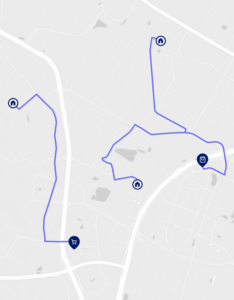(Pozdeyev-Vitaly/Shutterstock)
Arity’s IT staff is within the remaining stretch of a serious challenge to add greater than a trillion miles of driving knowledge to a brand new database on Amazon S3. But when it weren’t for the choice to alter its engine from Spark to Starburst, the challenge would nonetheless be caught in impartial.
arity is a subsidiary of Allstate that collects, aggregates and sells driving knowledge info for all makes use of. For instance, auto insurers use Arity mobility knowledge (composed of greater than 2 trillion miles of driving knowledge from greater than 50 million drivers) to search out ideally suited clients, retailers use it to judge driving patterns Clients and cell app builders, equivalent to Life360, use it to allow real-time monitoring of drivers.
Arity is typically contacted by state departments of transportation who’re focused on utilizing its geolocation knowledge to check visitors patterns on particular stretches of freeway. As a result of the Arity knowledge contains each the quantity and velocity of drivers, the DOT thought they might use the info to eradicate the necessity for on-site visitors assessments, that are pricey and harmful for crews deploying the “ropes” alongside the highway. .
Because the frequency of those DOT requests elevated, Arity determined he wanted to automate the method. As an alternative of asking an information engineer to write down and run advert hoc queries to acquire the requested knowledge, the corporate selected to create a system that might ship the info to DOTs sooner, simpler, and at much less price.
The corporate’s first inclination was to make use of Apache Spark expertise, which that they had been utilizing for the previous decade, stated Reza Banikazemi, director of programs structure at Arity.
“Historically, we use Spark and AWS EMR clusters,” Banikazemi stated. “For this explicit challenge, it took about six years of driving knowledge, so we wished to run and course of greater than a petabyte. Clearly price was an enormous issue, however so was the quantity of run time it will require. “These have been massive challenges.”
Arity knowledge engineers are skilled to write down extremely environment friendly Spark routines in Scala, which is Spark’s native language. The Artity staff started the challenge by testing whether or not this strategy can be possible with the primary section of the challenge, which was to carry out the preliminary loading of 1PB of historic driving knowledge that was saved as Parquet and ORC information in S3. The routines concerned aggregating the highway phase knowledge and loading it into S3 as Apache Iceberg tables (this was the corporate’s first Iceberg challenge).
“After we did our first POC earlier this yr, we took a small pattern of information,” Banikazemi stated. “We ran essentially the most optimized Spark we may. “We have now 45 minutes.”
At that fee, it will be very tough to finish the challenge on time. However along with timeliness, the price of the EMR strategy was additionally a priority.
“The price simply did not make a lot sense,” Banikazemi stated. BigDATAwire. “What occurs in Spark is, to begin with, each time you run a job, it’s a must to begin the cluster. Now, if we go for Spot cases (Amazon EC2) for an enormous cluster, it’s a must to struggle for Spot occasion availability if you wish to get any sort of respectable financial savings. Should you do it on demand, you’ll have to take care of an excessive quantity of prices.”
The steadiness of EMR teams and their tendency to fail in the course of a job was one other concern, Banikazemi stated. Arity evaluated utilizing Amazon Athena, which is AWS’s serverless Trino service, however observed that Athena “fails on giant queries very incessantly,” he stated.
That is when Arity determined to attempt one other strategy. The corporate had heard of an organization known as starburst which sells a managed service from Trino, known as Galaxy. Banikazemi examined the Galaxy service with the identical check knowledge that took EMR 45 minutes to course of and was stunned to see that it solely took 4 and a half minutes.
“After we noticed these preliminary outcomes, it was nearly a no brainer to say that is the best path for us,” Banikazemi stated.
Arity determined to rent Starburst for this explicit job. Starburst, working in Arity’s digital non-public cloud (VPC) on AWS, runs the preliminary knowledge loading and “filling” processes, and also will be the question engine that Arity gross sales engineers will use to acquire the outcomes. freeway phase knowledge for DOT clients.
What as soon as required an information engineer to write down complicated Spark Scala code can now be written by any competent knowledge analyst with plain outdated SQL, Banikazemi stated.
“One thing that we would have liked engineering for, we will now give to our skilled providers folks, to our gross sales engineers,” he stated. “Now we’re giving them entry to Starburst, they usually can go in there and do issues they could not earlier than.”
Along with saving Arity tons of of hundreds in EMR processing prices, Starburst additionally met Arity’s calls for for knowledge safety and privateness. Regardless of the necessity for strict privateness and safety controls, Starburst was capable of full the work on time, Banikazemi stated.
“On the finish of the day, Starburst hit the mark,” he stated. “Not solely have been we capable of get the info at a a lot decrease price, however we have been additionally capable of do it a lot sooner, so it was an enormous win for us this yr.”
Associated articles:
Starburst CEO Justin Borgman on Trino, Iceberg, and the Way forward for Huge Knowledge
Starburst introduces Icehouse, its Apache Iceberg managed service
Starburst provides knowledge frames to the Trino platform
apache spark, arity, massive knowledge, knowledge engineer, driving knowledge, emr, mobility knowledge, spark scale, SQL, starburst galaxy, trill



